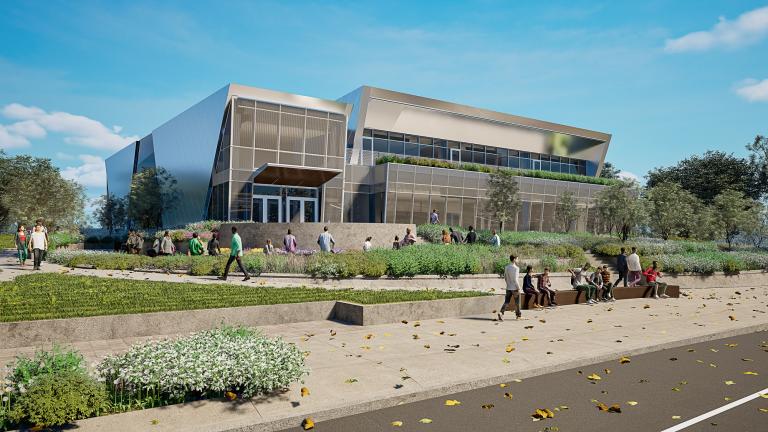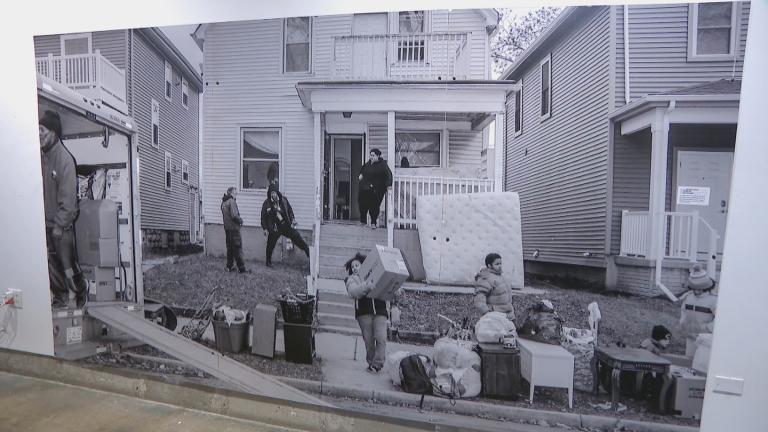Advocates pushing to expand protections for longtime homeowners in South Shore from gentrification sparked by the under-construction Obama Presidential Center in Jackson Park are hoping a nonbinding ballot question will breathe new life into their yearslong fight.
Voters in two precincts of the 7th Ward will find an advisory referendum on their March 19 primary ballot asking whether Ald. Greg Mitchell (7th Ward) and Mayor Brandon Johnson should “support a Community Benefits Agreement (CBA) ordinance to prevent the displacement of renters, condo & home owners in South Shore in light of the impact of the Obama Center and growing development in the area.”
Five months ago, Alds. Desmon Yancy (5th Ward) and Jeanette Taylor (20th Ward) introduced a measure backed by a coalition of community groups designed to blunt the impact of gentrification spurred by the $500 million presidential center now under construction in Jackson Park in South Shore.
The measure has yet to get even a hearing, much less a vote, by the City Council’s Housing Committee, frustrating Dixon Romeo, the executive director of Not Me We, a member of the coalition that has described South Shore as the “ground zero” of Chicago’s housing crisis, with a high eviction rate and surging real estate prices.
“It is definitely not moving at the speed we want,” Romeo said, adding that there had been some movement since September when the measure was introduced.
In September 2020, the City Council unanimously backed a $4.5 million package designed to prevent the presidential center — now scheduled to open in 2025 after years of delays — from supercharging gentrification in Woodlawn, which is part of Taylor’s ward. However, the agreement excluded South Shore in the 5th Ward, at the request of former Ald. Leslie Hairston.
The Obama Foundation did not oppose the Woodlawn protections but resisted calls for a community benefits agreement.
“We want our neighbors who have called this community home for decades to be able to continue to live on the South Side as long as they wish,” a spokesperson for the Obama Foundation said in a statement. “We appreciate the work done by many community organizers to keep affordable housing top of mind for policymakers, and we applaud the mayor and aldermen for making it a priority to give South Side residents the tools they need to remain a vibrant part of this community.”
Further complicating the coalition’s effort is the fact that South Shore is split between Yancy’s 5th Ward and Mitchell’s 7th Ward. Mitchell has not endorsed the proposal, and the Chicago City Council is highly unlikely to approve a measure that applies to Mitchell’s ward without his support as part of the decades-old tradition of giving alderpeople the final say over controversial issues in their wards.
Mitchell was not aware that voters in the sixth and eighth precincts would be asked to weigh in on the nonbinding ballot question until WTTW News asked him about it on Wednesday.
Voters will be asked whether Johnson and Mitchell should support “1) funding home repair, increasing homeownership & property tax relief 2) eviction protection, rental relief and a ban on application & move in fees 3) development of 100% income based social housing on city owned vacant lots & 4) local hiring and jobs programs.”
Those are all key provisions of the South Shore Housing Preservation Ordinance, backed by Yancy and Taylor.
Throughout South Shore, the measure would require at least 60% of any new residential development to be affordable to renters who earn no more than 30% of the area’s median income.
In addition, the proposal would earmark $5 million for redevelopment of vacant homes and multiunit buildings set aside for low- and moderate-income Chicagoans, as well as an additional $3 million for the city’s Preservation of Existing Affordable Rentals program, which offers landlords financial assistance from the city to purchase or refinance multifamily residential buildings in exchange for keeping the units affordable for 30 years.
An additional $5 million would be added to the Chicago Low-Income Trust Fund and an additional $12 million set aside for grants and down-payment assistance, as well as $20 million for home improvement grants and $2.3 million for grants to pay off property tax debt incurred by long-term residents, according to the proposal.
The coalition urging city officials to expand gentrification protections into South Shore has often turned to the provision of state law that allows advisory referendums to be put to voters in an attempt to show broad public support for a cause.
As recently as 2023, a nonbinding measure found widespread support for protections from gentrification among residents near the center, as well as for a plan to build affordable housing on the vacant lot at 63rd Street and Blackstone Avenue, the largest city-owned lot in Woodlawn.
“Mayor Brandon Johnson promised to invest in people, and we want to show him this would be a great way to do it,” Romeo said.
Contact Heather Cherone: @HeatherCherone | (773) 569-1863 | [email protected]








